We do not know when this way of thinking began, but many people think they need visible fruits, for example, wealth, to be recognized for their success. To define success, modern society presents a standard set of talents, and college students are expected to develop these. Some students attain success within this prescribed set, but others have difficulty or even fail. Is it enough to follow the straight and narrow frame that society demands of us? Is it wrong for young people to devote time and energy to other interests that they like?

| Deok-hoo is general term for people who are absorbed in something apart from the prescribed set of talents and pursuits. The closest analogue in English is the word “geek,” but in English there are also positive connotations through words such as enthusiast or, borrowed from Italian, aficionado. Originally, it referred only to people who like animation or science fiction. However, the term covers a wider range of interests these days. | Deok-jil is an interest that a Deok-hoo is following. Typically, a Deok-hoo immerses him- or herself deeply in the target interest and collects materials and technology needed for that pursuit. Both terms-Deok-hoo and Deok-jil-are used pejoratively, and -jil is a suffix that is used to disparage a job or duty, but this pejorative sense has expanded to include any work or activity. |
Are you a Deok-hoo? Is this a rude question? Do you get angry when someone suggests that you might be? A few years ago, media presented the Deok-hoo as an eccentric. People in television programs mocked Deok-hoos by suggesting that they were weird compared to normal people. But now, portrayals are changing. On November 13, Munhwa Broadcasting Corporation (MBC) launched a new program called The Capable.
This program contacts Deok-hoos in various fields and introduces them as talented innovators. Deok-hoos take a test to verify their own abilities, and those who pass the test may go on to win first place. If they win, they receive a Deok-ryeo-geum, a financial grant to continue their Deok-jil. Viewers also enjoy the show and report themselves or their friends as Deok-hoo. In this way, Deok-hoo is no longer a negative term, but has become quite general and even positive. Deok-hoo culture is widening and bringing a new wave to society. Let’s take a deeper look into Deok-hoo culture.
How did Deok-hoo culture begin?
The term derives from a Japanese word, Otaku which originally meant “residence.” But the Japanese meaning began to fade when an adult comic magazine used it to mean “geek.” As the term flowed into Korea, Koreans initially used the term Otaku as it was. But as time went by, they transformed the term into Deok-hoo, which is shorter and sounds more Korean. Thus, Otaku and Deok-hoo are nearly synonyms.
How, and why, did Otaku emerge in Japan? In the 1980s, Japan greeted its economic golden age, but along with that new prosperity, the government had no plans for continuing development. This became a period without direction, and the generation born after 1965 felt less competitive. They did not have to struggle for survival because there was nothing lacking in their lives and they did not need to worry about the future. People lost interest in intellectual and personal development, as well, and some failed to adjust to the new society. Instead, they started to find meaning in life through lifestyle that became known as “plunging.” People started to plunge themselves into one area that fit them individualistically, entering subcultures focusing particularly on animation, cartoons, and games.
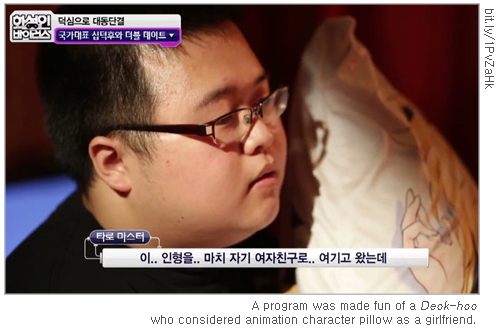
In Korea, however, Deok-hoo culture has taken a long time to develop. Compared to Japan, subculture in Korea was not common in the 1980s. It took three steps to reach the level of flourishing that we see today according to Hee-soo Lim, a researcher from the research laboratory of the Univ Tomorrow, a magazine published for college students. First, as Otaku culture flowed from Japan to Korea, some Koreans started to indulge in Japanese subculture. This initial market became known as Korean Otaku. Second, Internet communities have appeared. Foremost among these was a community called DCInside, where the concept of Deok-jil first took hold. The site featured galleries from numerous fields, giving users the opportunity to choose their interests. Lastly, idol fandom culture functioned to change social perception. In the late 1990s, idol pop groups emerged in Korean society, and along with these fan clubs took shape, too. Accordingly, goods and contents featuring the members of these idol groups were sold and formed another niche in the market. Talented Deok-hoo then began creating their own contents such as fan-fiction and pictorials, further widening the influence. As a result of these processes, Deok-hoo has become fully embedded in Korea.
Deok-hoos are in our community. Take a look around. The UOS Times conducted a survey of the University of Seoul(UOS) students to find out about their attitudes toward Deok-hoo. We can draw interesting conclusions from this survey(Surveys are on the next page).
How much has Deok-hoo culture been generalized? About 70 percent of respondents answered that they are active in various Deok-jil. Among these students, only about five percent replied that they do Deok-jil activities in secret. The rest of the students said that they do not try to hide their activities and even announce them to others. This shows a changing perception of Deok-hoo culture among students, toward more general and less negative.
Q1. Another question might be then brought up; Do students consider their jobs to be related to their Deok-jil? This question invited a lot of negative comments from students. Most Deok-hoo respondents worry about whether they should carry their hobbies into livelihood. They regard Deok-jil as entertainment, so they would like to keep their hobbies free from the stress of a job. By contrast, some people want to have a job in their field of Deok-jil, but they have some doubts about harsh reality of work. Especially in the field of art, it is commonplace for them to receive Yeol-jeong pay.
Q2. As mentioned earlier, society demands a variety of talents and appreciates standardized success. However, as we discovered in our survey, and as shown in Figure 3.1, more UOS students think of self-realization as equally important to wealth. This result shows us that although wealth is still regarded as the most important, or even the sole, standard for success in society, student values are changing. More than half of the students answered that it will be hard to attain such success, with about five percent responding that it would be impossible. In modern society, students seem to be wandering among choices: they do not select Deok-up Il-chi as that choice may harm them and their passion, yet they are also becoming skeptical about reaching societies standard of success.
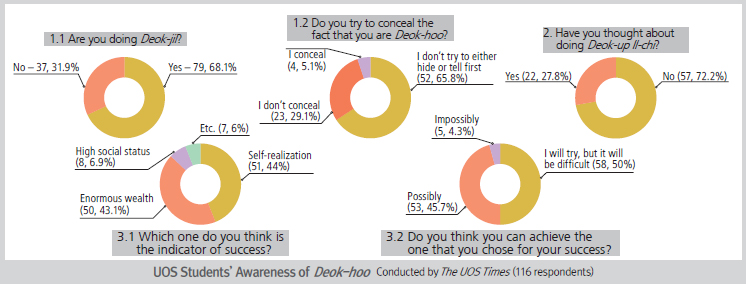
In Korean society, perceptions of Deok-hoo culture are changing. In the early days of the cultural influx, people viewed Deok-hoos as social misfits or freaks. In this day and age, however, they see the social influence of Deok-hoos in a new light. Deok-hoos, meanwhile, derive great satisfaction while doing their Deok-jil. Moreover, there is a sense of the future in what they do because they invest their time or money to achieve greater self-fulfillment. They can even accomplish Deok-up Il-chi if they choose to foster their hobby or otherwise work as semi-experts if they work wisely. It seems that Deok-hoos deserve more spotlight than they used to receive.
There are Deok-hoos in the UOS community. The UOS Times recently met and spoke at length with two of them. We discovered that they are nothing special compared to students who do not consider themselves to be a Deok-hoo. During the interviews, these students were filled with enthusiasm for introducing their interests. As we follow these interviews, we will sense their tremendous energy.
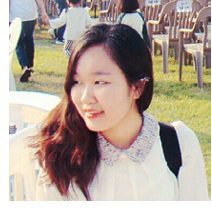
Dept. of Korean Language and Literature, ’10
Han is a YeonMyuDeok, an aficionado of musical theater. The term derives from a combination of Yeon-geuk (play) and Myu, from the word musical.
Motivation behind Ip(入)-deok
Han’s fascination with musical theater began when she had an opportunity to write a play for a festival in her department. To prepare and find inspiration, she decided to watch a performance. The musical that she saw brought her all the way to the point she is at now. “It was 100 minutes long. I held my breath and maintained correct posture from beginning to end. I felt in awe of the combination of acting, lighting, and all the elements of the production,” said Han, reminiscing about the astonishment that she experienced from that first show. She was especially impressed by the actors. “They deal with things that we do not see in pop culture. Scarcity has a great charm. These actors have the confidence to tell us about these things from the underground! Theaters are usually underground.”
Show Off Your Deok Power!
“Usually, people just throw away their tickets after a play. However, I wanted to keep a trace, so I started to make a book to collect tickets.” She offered to show us her ticket book.
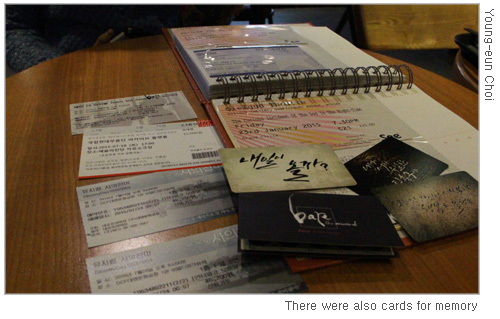
What impressed us most was her travel stories. Generally, people put priority on the travel itself, rather than on a detailed plan. Han, however, hoped to watch plays and musicals that were not imported to Korea and made up her mind to travel to Europe. The West End of London, for example, is famous for its theaters. “I met an English YeonMuDeok while waiting to buy a ticket for one of these plays. He said he had already watched it 25 times. We talked, and developed respect for each other.”
The Charm of the Play
Han pointed out stage performance is an art distinct from writing or literature. “I think liveliness is the greatest difference. We cannot feel this through writing alone, such as novels or scripts.”
She also emphasized that plays and musicals are for the few. “If you think about it, it is unusual to find a normal main character. Plays portray characters who are in the minority. Sometimes they are hard to watch because I feel like they are scratching old wounds. However, I think it is very meaningful to have this alternative to the more stereotyped popular culture.”
Will you achieve Deok-up Il-chi?
“As a student majoring in Korean Language and Literature, I have a large variety of choices for my career, but I do not think this field will help my employment. Also, as much as I love it, I know lots of unsavory things about it. I know about the problem of yeol-jeong pay in culture and arts. I have a lot of doubts about this business. Nevertheless, I may keep one foot just on the edge of it.”

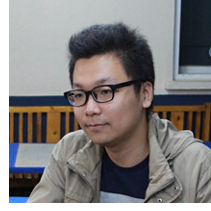
Dept. of Geo-Informatics, ’13
Shin is a Deok-hoo for board games.
Motivation behind Ip(入)-deok
When he was 12, Shin first encountered board games at the suggestion of a friend. He felt another attraction from this compared to online games. “I just enjoyed the games until I was a teenager, but my interest grew fast. So, I went to the Korea Board Game Designers’ Association (KBDA), and learned a lot by helping designers.
Show Off Your Deok Power!
Because of his passion, Shin has an unusual opportunity as a student. In addition to his studies, he has a job doing what he truly loves. He is now working at a board game publishing company, Deinko. “I joined KBDA as soon as I finished my College Scholastic Ability Test. I also participated in making games, but my main job was translating the game to export abroad. This helped me get a job in Deinko quite naturally.” Also this year, Shin visited a board game fair in Germany as an interpreter for Deinko. Shin is the president of Avalon, the UOS board game club, which had decided to elevate into central club from next semester. Avalon is a club that started with five members who wanted to play board games. “I was happy about the fact that there are other students who like board games,” Shin said.
Shin told us about both happy and regrettable moments as president of Avalon. “There are many genres in board games. I feel really great when members encounter this variety of genres and find their favorite one. It is an extension of their knowledge of board games. On the other hand, there are some members who stick to certain genres. They express their desire to play specific games. Some don’t want to attend meetings because there are no games they want to play.”
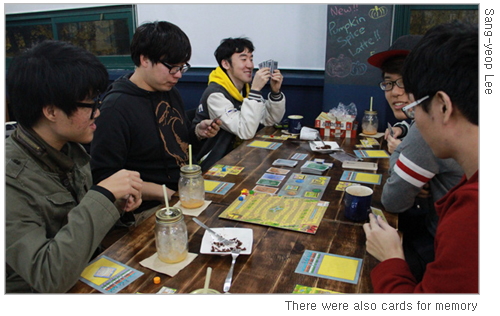
“First of all, interaction is the most important merit of the board game. In contrast to general online games, we need to study our opponents’ faces and body language, even though we also need to habitually cheat or trick others to win the game. This is very different from online games. Secondly, there is a battle of wits to a board game. In an online game, if there is something to calculate, the computer does it automatically, so we do not have to think about it. In board games, however, we have to calculate for ourselves, and this makes it possible to change the leader of the game. We can call it brain work; it is clearly different from other kinds of games. Lastly, we can exercise our imagination. We can see clear images of things like fireballs or magic in online games, but in board games we have to conceive of the image. It’s analogous to the difference between the novel and the comic.”
Will you achieve Deok-up Il-chi?
“I will continue my job, translating board games, on the side at least. I am not sure that I will work in this business in the future, though. If I want that to happen, it will, and for better or worse, it will always be a part of my life.” Shin has a positive view of Deok-up Il-chi overall. “I think it is individual preference. It depends on how they balance between work and hobby. I think these two are entirely separate, so I think Deok-up Il-chi is a wonderful thing.” According to his account, the board game industry seems to be flourishing again. He also hopes that this trend continues.
Sang-yeop Lee
syl0616@uos.ac.kr

